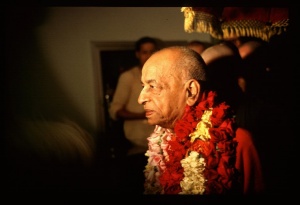CC Madhya 14.179: Difference between revisions
No edit summary |
(Vanibot #0054 edit - transform synonyms into clickable links, which search similar occurrences) |
||
| Line 17: | Line 17: | ||
<div class="synonyms"> | <div class="synonyms"> | ||
''ei | ''[//vanipedia.org/wiki/Special:VaniSearch?s=ei&tab=syno_o&ds=1 ei] [//vanipedia.org/wiki/Special:VaniSearch?s=bhāva&tab=syno_o&ds=1 bhāva]'' — ''with these ecstatic symptoms; ''[//vanipedia.org/wiki/Special:VaniSearch?s=yukta&tab=syno_o&ds=1 yukta]'' — combined together; ''[//vanipedia.org/wiki/Special:VaniSearch?s=dekhi’&tab=syno_o&ds=1 dekhi’]'' — seeing; ''[//vanipedia.org/wiki/Special:VaniSearch?s=rādhā&tab=syno_o&ds=1 rādhā]-[//vanipedia.org/wiki/Special:VaniSearch?s=āsya&tab=syno_o&ds=1 āsya]-[//vanipedia.org/wiki/Special:VaniSearch?s=nayana&tab=syno_o&ds=1 nayana]'' — the face and eyes of Śrīmatī Rādhārāṇī; ''[//vanipedia.org/wiki/Special:VaniSearch?s=saṅgama&tab=syno_o&ds=1 saṅgama] [//vanipedia.org/wiki/Special:VaniSearch?s=ha&tab=syno_o&ds=1 ha]-[//vanipedia.org/wiki/Special:VaniSearch?s=ite&tab=syno_o&ds=1 ite]'' — than direct embracing; ''[//vanipedia.org/wiki/Special:VaniSearch?s=sukha&tab=syno_o&ds=1 sukha] [//vanipedia.org/wiki/Special:VaniSearch?s=pāya&tab=syno_o&ds=1 pāya]'' — enjoys happiness; ''[//vanipedia.org/wiki/Special:VaniSearch?s=koṭi&tab=syno_o&ds=1 koṭi]-[//vanipedia.org/wiki/Special:VaniSearch?s=guṇa&tab=syno_o&ds=1 guṇa]'' — ''millions of times more. | ||
</div> | </div> | ||
Latest revision as of 21:46, 19 February 2024

His Divine Grace
A.C. Bhaktivedanta Swami Prabhupada
A.C. Bhaktivedanta Swami Prabhupada
TEXT 179
- ei bhāva-yukta dekhi’ rādhāsya-nayana
- saṅgama ha-ite sukha pāya koṭi-guṇa
SYNONYMS
ei bhāva — with these ecstatic symptoms; yukta — combined together; dekhi’ — seeing; rādhā-āsya-nayana — the face and eyes of Śrīmatī Rādhārāṇī; saṅgama ha-ite — than direct embracing; sukha pāya — enjoys happiness; koṭi-guṇa — millions of times more.
TRANSLATION
“Lord Śrī Kṛṣṇa is thousands upon thousands of times more satisfied when He sees Śrīmatī Rādhārāṇī’s face light up from this combination of ecstatic love than He is by direct union with Her.
PURPORT
This is further explained in the following verse from the Ujjvala-nīlamaṇi (Anubhāva-prakaraṇa 41) of Śrīla Rūpa Gosvāmī.